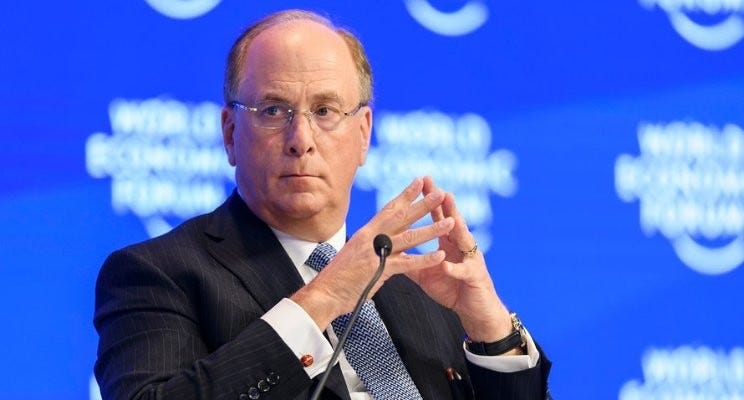What happened to ESG?
Has the idea of rewarding or punishing a company for their environmental, social, and governance impact gone away? Or is a rebrand the more likely outcome?
A few years ago, the investing world was swept up in a surge of Environmental, Social, and Governance (ESG) rules that purported to allow corporations to ‘do well by doing good’ and contribute to the ‘triple bottom line.’
In the age of woke everything, with corporations clearly painted as the enemy of ‘social justice’, ESG guidelines were supposed to ensure that companies would prioritize environmental sustainability, social responsibility, and ethical governance alongside profitability.
This wasn’t just a ‘nice to have’ — for corporations it became a ‘must have.’

Much of the ESG madness was driven by Larry Fink, the CEO of BlackRock and arguably one of the most influential men on earth. His incredibly powerful investment firm manages trillions of dollars for pension funds, endowments, governments, companies, and individuals. BlackRock is one of the three main shareholders in more than 80% of the largest companies on the stock market.
With such deep investments in the world’s biggest businesses, BlackRock and Fink have outsized influence via shareholder voting power, which basically allows them to tell CEOs what they should and shouldn’t do (if they know what’s good for them).
Just two years ago, Fink told CEOs to get on the ESG bus, using the kind of language usually reserved for World Economic Forum meetings in Davos. In his 2022 annual ‘Letter to CEOs’, Fink wrote:
Stakeholder capitalism is all about delivering long-term, durable returns for shareholders. And transparency around your company’s planning for a net zero world is an important element of that. But it’s just one of many disclosures we and other investors ask companies to make. As stewards of our clients’ capital, we ask businesses to demonstrate how they’re going to deliver on their responsibility to shareholders, including through sound environmental, social, and governance practices and policies.

While Fink called out net zero climate policies specifically, companies were also expected to promote anti-racism initiatives, ensure diversity and equity in the workplace, and publicly advocate for trans rights and inclusion. A rather odd confluence of politics and private enterprise.
Many businesses rushed to figure out how to comply, even while notable political backlash to Fink's letter and to the broader ESG movement began simmering. Critics argued that ESG initiatives caused companies to overly focus on optics, leading to virtue signaling and greenwashing without taking meaningful action.
Others critiqued ESG as a form of "woke capitalism" and expressed concerns about the potential negative impacts on economic growth and shareholder returns.
Now it appears the adverse reactions have had some impact.
”I couldn’t move for people talking to me about ESG a few years ago, and now whoosh, nobody mentions it,” said Katie Martin, a columnist for the FT, on an episode of the Unhedged podcast last week. “It’s not on the websites. It’s not in the conversations. You know, it’s just sort of disappeared. Is it dying?”
Fink might say ESG is not dying, it’s just transitioning. As the Wall Street Journal reported on March 3, “the world’s biggest asset manager has abandoned the acronym while still pumping billions of dollars into clean energy.”
After crusading for years for investment funds and companies to take into account environmental, social and governance factors, Larry Fink has purged the letters from his vocabulary.
He attempted to use BlackRock’s clout as the steward for millions of investors to prod companies toward climate-friendly policies and press them to disclose the social effects of their businesses. He long argued that the world’s largest asset manager and its peers could make money and make the world a better place at the same time.
Fast forward to 2024, and the chief executive has stopped mentioning the acronym in public letters and comments. He retreated after a backlash from conservative pundits against “woke capitalism” made the term politically toxic. Furthermore, he faced criticism, even in the finance industry, from people who said he was moralizing, playing God and stepping beyond BlackRock’s fiduciary duty to maximize financial returns for clients.
BlackRock is still wagering that fighting climate change will be a generational investment opportunity—but the company is no longer pushing for changes in corporate behavior, talking about hard-to-quantify social issues or actively promoting ESG investing criteria. Instead, it is directing billions of client dollars toward infrastructure projects that will help speed the transition from fossil fuels.
“Transition investing is specific and concrete. Clients know what we’re talking about,” said Mark Wiedman, who is head of the global client business at BlackRock and a potential successor to Fink. “ESG as a category is a vague grab bag for many clients.”
Not only vague, but unnecessary if the core principle still holds that a corporation's primary responsibility is to its shareholders. While it's true that the actions of businesses have an impact on various groups, including employees, customers, and the community at large, it's essential to recognize that these interests will ultimately align with shareholder value by virtue of the law of supply and demand.

A company that virtue signals and loses sight of its original value proposition learns the hard way, like Bud Light and Disney did, that the new mantra for running a business is: ‘Go woke. Go broke.’ Conversely, a company that sincerely treats its employees well, produces quality products, innovates, and operates ethically is likely to attract customers, retain talent, and maintain a positive reputation — ultimately contributing to its long-term profitability.
Realistically, while the formal ESG framework may be starting to disappear, its underlying principles are likely to persist in some form largely because woke culture demands it. These factors could lead to ESG re-emerging in the near future under a different name or structure (anyone remember ‘corporate social responsibility?’).
Whatever the powers-that-be decide to call it next, it begs the question: shouldn’t we just trust in the power of the free market to drive positive change? If consumers demand sustainable products and employees seek out companies with strong ethical principles, won’t businesses that prioritize these considerations naturally thrive, while those that neglect them face the consequences in terms of reputation and profitability? Whatever happens, be on the lookout for a softer, gentler, more nuanced woke agenda coming to a company near you.






There’s no way ESGs are going away regardless of the lie Fink tells. You can see the effect already whenever a company uses the terms, “sustainable” “renewable” “responsible” “diversity” etc. They’re winning points to achieve favorable interest on loans and and favorable treatment from government regulations. There isn’t a CEO that doesn’t feel the pressure to follow these new world edicts. Basically it’s the Chinese social credit system adapted to our way of life. They know individuals would push back, so they forced it on employers so it trickles down to the rest of us under a veil of virtue.